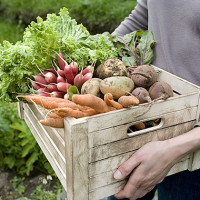One of the many vintage autos that line the streets of Cuba. Photo Submitted.
The flight from Cancun to Havana takes only 45 minutes, but in that short time, one is transported to a world of 50 years ago. Ancient American cars rumble down the streets of Havana belching smoke, full of Cubans who are laughing and talking loudly. Nobody rides alone in Cuba. I am riding in a relatively “new” Lada Riva, a leftover from the Soviet era that shakes and rattles like the shocks gave out years ago. I am carrying a vintage ‘70s suitcase that I bought at the Church Mouse for $10 and thought would look inconspicuous. It was filled with items like computer spare parts, memory sticks and quality kitchen equipment, which were all provided by Slow Food Sonoma Valley. They were all gifts for my friend Tito Nunez Guidas, who runs a sustainable restaurant in the Sierra del Rosario, 50 miles outside of Havana. As I watched my 30-year-old American Tourister suitcase ride the wave of new bags into the waiting arms of the mostly European tourists, I realized just how conspicuous it was and how, if I were a customs officer, it would be the first one I would search. Happily, I breezed right through.
Havana is an intoxicating blend of crumbling buildings, tropical breezes and nonstop salsa. People don’t come to Cuba for the food, but I make it my mission to eat well wherever I go, and Cuba was no exception. The typical Criollo food of Cuba is a blend of Spanish and Caribbean and is heavy on meat, black beans and rice and light on fruit and vegetables. One of my favorites was called “tostones,” which is an unripe plantain that is fried and then flattened and then fried again until crisp. Perfect with a mojito. In fact, everything seemed to go well with a mojito. Another favorite was called ropa vieja, which means “old clothes.” It is skirt or flank steak that is cooked for a long time in a tomato, garlic and pepper sauce and then shredded. A Cuban friend described it as “Cuban comfort food.”
On a previous trip to Cuba, I had met Tito and became familiar with his “Eco-Restaurant El Romero,” which was established in 2003. His vegetarian restaurant is a bit of an anomaly in Cuba. He also makes it a point to compost, grow his own food for the restaurant and use solar energy for cooking. For Tito, being sustainable is not just a marketing slogan. His restaurant is sustainable basically because there are not a lot of other choices in rural Cuba. Food markets are few and far between, and energy is a precious commodity not to be wasted.
El Romero is located in a place called “Las Terazzas,” which is a community of 1,000 residents on the site of a former French coffee plantation that had decimated and eroded the land. The area was reforested 40 years ago by building terraces and planting more than six million trees and native plants.
El Romero sits in the middle of an apartment complex, which in Cuba means lots of dogs, chickens and people, all making their presence known. Cuba is not a place for quiet contemplation. The solar oven is right in front of the front door, next to a tomato garden that is completely netted to protect the plants from the free-ranging chickens. Up on a hill is the vegetable and herb garden, all in raised beds. There is a small orchard that provides a year-round supply of mangoes, bananas, guavas, coconuts, star fruit and avocados. All the waste from the restaurant is either composted or fed to the animals.
The restaurant is quite small, with rough-hewn furniture and artistic homemade decorations. Every meal begins with a complimentary lotus root salad, served in a half-coconut shell. My first meal at El Romero began with a chilled pumpkin soup with a little squiggle of bright red beet puree followed by “insolata,” a salad of solar-roasted vegetables. The main course was chickpea and vegetable fritters. I went back enough times to eat my way through the entire menu. Every dish was imbued with the spirit of Tito and a shining example of a truly sustainable restaurant.
Please send food, wine, restaurant news and event information to foodandwine@sonomasun.com







